- Home
- Jeanne Kalogridis
The Orphan of Florence Page 5
The Orphan of Florence Read online
Page 5
This dog looked capable of doing the same. It lunged at me with a bowel-loosening snarl.
I cringed and raised the poker as my captor said, in a voice ludicrously calm for the situation, “Stop, Leo.”
Leo stopped in mid-lunge, sat, and looked curiously back at his master, who had glimpsed the poker in my hand. The latter gave a short laugh and said, in a tone as soft and unworried as he’d used with the mastiff, “Oh, good God. What’re you going to do with that?”
His accent had shifted. It was that of the streets, and he spoke it easily, naturally. Just like I spoke it then, even though the nuns—most of them from wealthy families—had raised us to sound like members of the merchant class.
“I’m afraid of the dog,” I said in a small voice.
He sighed, his tone long-suffering. “Put down the poker. And hold out your hand, knuckles first.”
I stared at the dog. If Ser Giovanni wanted to, he could tell it to attack. Mastiffs are known for being impervious to pain, and it wouldn’t even have felt a few blows with an iron poker before it tore out my throat.
Something about the way the dog looked adoringly up at his master convinced me to set the poker down on the lovely carpet. I held out my unsteady hand, knuckles first.
Ser Giovanni looked at the patiently waiting animal. A glistening ribbon of thick saliva welled from its pendulous muzzle, dangled for an instant a finger’s length from its chin, and gradually thinned all the way down to the floor, like a spider dropping from the ceiling. I knew it was drooling with the desire to eat my innards.
“Now, Leo,” he said, as if speaking to a person. “This is…” He frowned and glanced up at me suddenly. “What’s your name, lad?”
“Giuliano,” I said. Close enough.
“Leo, this is Giuliano, a friend. Go sniff.”
The obedient animal lumbered over to me. It stank, but probably smelled a lot better than I did that night. I tried to keep my fist from trembling as the dog snuffled it with its glistening black nose. Ser Giovanni could give it the order to attack at any instant.
“Good boy, Leo,” his master soothed. The mastiff’s stub of a tail wagged. “Stand up easily and pet him now, Giuliano. Let him smell you as much as he wants.”
I stood up and slowly opened my hand. Leo—whose shoulder came to my waist—sat panting, mouth half open in a friendly grin, huge tongue lolling to one side with endearing gracelessness.
For an instant, I was confused. Why was I making friends with the dog? And then I realized: Leo was learning my scent in case I tried to run.
“He’ll protect you, too, now,” Ser Giovanni said, “so long as you don’t try to hurt me. Even without Leo, you wouldn’t have much luck.” He pointed to the gold charm at his heart. “Protection. Made by the Magician of Florence.”
I stared at the charm as it flashed with firelight. It was fine jewelry made with exquisite skill and, save for the fact that it was gold, it looked very like the one Tommaso now wore. For the umpteenth time that night, I fervently wished I’d been wearing it instead.
“You know my name,” I said to my captor at last. “But I’m not so sure of yours.”
“Eh,” he said. “That will come later, if at all. It depends.”
“Depends on what?”
He drew a breath and released it as he sank into a squat in front of the fire and warmed his hands. “How you respond to my … business proposition, and whether we come to trust each other.”
I stared at him. The stiletto, his strength, his dragging me out here … He was certainly an uncommon criminal. A master of crime, given his wealth.
“Trust each other?” I retorted. “I’m a lad with no means of protection, and you’re a brute with many. A man like you doesn’t bring pickpockets in from the street out of charity.”
He scowled. “You’re too cynical for your age.”
“With good reason. Say your piece, then I’ll be on my way.”
Leo raised a paw as big as my hand and rested it heavily on my forearm, directing me to scratch the front of his chest. I didn’t dare disobey. I scratched the dog until he thumped his rear leg in ecstasy.
“I’m in a business that requires an assistant with fast feet and hands, and the ability to keep his mouth shut,” my captor said. “I’m sorry I had to scare you to get you here. But you’d never have believed me and considered my proposition otherwise.”
I still didn’t believe him. No one lurking around the Buco in disguise had honest business in mind. But the mastiff was right next to me, drooling on my boot, so I pretended to take Ser Giovanni seriously.
“What sort of work?” I asked.
Ignoring the question, he stood up. “We need to take care of that knee before it starts rotting. Come with me into the kitchen and we’ll clean it up. Besides, it’s past time for my supper, and I’m starving. Let’s eat now and talk later.”
I would have insisted on an answer, but I’d been starving before I picked his pocket at the Buco. If I was going to die, at least I’d have a full belly.
I rose. Sitting down had made my joint stiffer. I half limped behind my captor into the kitchen, the dog following.
Ser Giovanni ambled into the kitchen and pulled a stool up to the middle of the long working table, right under a sconce.
“Off with the leggings,” he said.
There it was. He was a rotten lying bastard, and I had no razor, no space to run. He was after a lad; he’d be enraged to discover I was a girl.
“I can’t,” I said, hiding my rage, making my voice sound tearful.
He sighed and rolled his eyes. “Don’t flatter yourself; I’m not interested in you that way. How else can we clean the knee? Unless you want to die in a week when it festers.”
I’m very good at lies, but at that moment, I couldn’t think of a single good one. “I can’t,” I repeated.
Curious, he squinted at me. “I never knew an urchin could be such a prude.”
“Please don’t make me,” I begged.
He gestured at the stool, his tone firm. “Leave the damned leggings on, then. But sit down.”
Relieved, I did.
He went to the cupboard nearest the oven and pulled out a paring knife, put the blade between his teeth and rummaged in a cupboard before pulling out a corked jug.
He set it down on the table and gestured for me to lift my knee off the stool. I did, and he slipped a clean rag under it. Then he uncorked the jug before lifting it again.
“Ready?” he asked. “This will sting.”
I nodded, catching a whiff of yeast just before he poured the wine on my knee. It stung all right; I gritted my teeth while he poured until the dried blood was mostly dissolved. He would have yanked the wool away from the wound, but I pushed his hand away and did it myself. Then I dabbed at the gash with the dry edge of the rag.
It was a game he was playing, trying to get me to trust him. Maybe he preferred a willing victim.
He set the jug of wine down, took up the paring knife, and cut the dirty bit of legging away to expose the gash.
“That’ll keep it from putrefying for the moment,” he said. “And now…” He went to one of the cupboards, clattered about inside, and returned with two spoons and two bowls. One of the spoons he handed to me.
I stared as he went over to the cauldron hung over the kitchen fire and ladled stew into each bowl, then broke some chunks of bread from the loaves on the hearth and set them atop the soup.
“Where are the servants?” I asked, trying not to sound as suspicious as I felt. No wealthy man served himself supper, and no wealthy man with good intentions served it to a pauper.
He didn’t answer; I had no choice but to limp after him.
He led me to a small dining room off the kitchen, already lit by tapers burning on the table, as if we’d been expected. The room was shadowy, but not quite enough to hide the oil paintings on the wall.
Or the gold candelabrum that held the burning tapers. My fear warred with the sheer agony
of being near such valuable things without the means of hauling them off; it was as cruel as making a starving man watch others eat a banquet.
Leo flopped down beside the chair Ser Giovanni took.
He lifted a thick black brow. “Pray if you like. My God isn’t particular about such things.” And he tucked into his stew.
It was thick with rabbit meat, vegetables, and raviolini, and the smell of it made me drool like the mastiff. It could have been drugged or poisoned, but if I was doomed, I might as well appreciate such a succulent last meal.
As I ate, my captor looked up from his dish. “If you work for me,” he said, munching his bread, “I’ll pay you well. Ridiculously well. But the condition is that you sleep here. You’ll need the protection this place provides.”
I studied his brown eye and saw tiny candle flames reflected there, but nothing else; I might as well have been trying to read stone. He could have been a madman, a murderer, the world’s most dangerous criminal. With the black silk patch over the other eye, he certainly looked the part.
“And what exactly is the ridiculous pay?”
“A florin if you agree to stay and train for an … errand, to be accomplished in a few weeks. More, after that, if the arrangement becomes permanent,” he answered.
I choked on my bread and barely managed to cough it up. He was a madman, then, to think I would believe such an outrageous lie. A gold florin was more than most well-fed merchants made in a year.
“Bullshit,” I said before I could stop myself.
My host grinned, slipped a hand into an invisible pocket and drew out a coin. I knew counterfeits when I saw them, and this florin was pure gold, just like the candelabrum. He held it up to the candlelight so that it glittered.
“Here.” He handed it across the table to me. “Your first payment in advance.”
I snatched it and bit into it; the soft gold yielded slightly to my teeth. It was a real florin, right there in my hand. I wasn’t so stupid as to think he’d let me walk out alive with it, but instinct took over; I folded my fingers over it tightly and slipped it into the waist of my leggings.
I played along. “A whole florin for a few weeks’ work?”
He nodded, letting his spoonful of soup rest midway between his lips and the bowl. “If you perform the errand well, there’ll be a second florin as a reward—and, if we get along, more permanent employment of a florin per year. Perhaps more.”
I held back a sneer of contempt. He was an idiot to think I’d believe such a stupid lie.
He saw my disbelief and continued, “As I said, it’s dangerous work—but then, no more dangerous than your line of work. As a skilled pickpocket, you’re well suited. I’ve been watching you. And as you proved in the alley, you’re very, very smart in a way no other pickpocket on the streets is. That’s a unique set of talents I can use.”
The skin on my upper arms pricked. If he really had been watching me, then he knew about Tommaso. I shook off the ridiculous fear, reminding myself that he couldn’t win me over by threatening the boy. Nothing could break my heart.
“What is it exactly that you’re asking me to do, Ser Giovanni?”
His expression remained unreadable. “We’ll talk about that after you agree to take the job.”
“That’s not fair,” I said. “What if you’re lying and it’s more dangerous than my current line of work? I’d have to refuse.”
He grinned as if I’d just told a very funny joke. His teeth were small but only a little yellowed, in good shape for someone his age. “You won’t refuse me,” he said jovially.
I lifted my chin, defiant. “How can you know that I won’t say no?” It was all bluster, of course, and he knew it. He had his physical strength, the weapons, the dog.
His confident smile broadened. “I know. Because I, dear lad, am the Magician of Florence.”
Three
When I could catch my breath, I said, “I don’t believe you. You’re going to have to prove it.”
He was a madman, surely. I sensed he wasn’t lying, that he believed what he said.
But it couldn’t be true. Although … there was the convincing disguise, the way he had seemed so old and feeble, and the omnipotent way he had looked at me when he’d held the stiletto to my throat, as if he were God. And there was the priceless gold talisman over his heart, the talisman that looked so much like mine.
“If you’re the Magician,” I ventured, “you wouldn’t need all the elaborate security.”
All the locks might have made sense if he’d lived in Rome, where the Church’s influence was strong and anyone found practicing sorcery would be burned as a heretic. But the Florentine government usually looked the other way, especially when the wealthy were involved.
He didn’t take offense, didn’t argue, didn’t respond; his tone was purely practical. “I’ll give you proof if you agree to take the job now,” he said. “It requires a little playacting and acrobatics for now, and later, perhaps, some assistance to me in my work. But you must swear first on whatever you hold dear never to reveal what I show you. Otherwise, you can go home and tell everyone you were abducted by the Magician of Florence and not a soul will believe you.”
He leaned over his bowl and attacked his stew again, then stuffed a wad of bread into his mouth.
I couldn’t believe him, but there was that damned talisman staring me in the face. To know whether he was a lunatic, a criminal, or the Magician, I’d have to take the next step.
“All right,” I said finally. “I’ll take the job. I swear on my own life not to reveal anything you show me, anything you say.”
He set down his spoon. “Good. Now first, explain it to me. Your literacy. The secret alphabet.”
* * *
When I was around six or so, Sister Maria Ignatia announced that we girls were finally old enough to be schooled. I was terribly excited. And terribly disappointed when the schooling turned out to be sewing, embroidery, etiquette, cooking, and household finances—but no reading or writing. Those, according to the abbess, were the province of men.
I found this unacceptable. I’d been born with a love of words and an ease in learning them. I’d been dreaming of the day I’d hold a quill in my hand and form my first letters.
And, I suppose, I’d been born with the sort of stubbornness and disregard for authority that makes a good thief. So when the boys and girls met for dance lessons after chapel—the only time the sexes were allow to intermingle, under the nonexistent watch of tipsy dozing priests from the boys’ orphanage—I managed to befriend a lad who recognized my intelligence and was sympathetic. Lauro was several years older than I. At the dances he would trace the letters on my palm with his finger and pronounce them for me; later, we became daring and he led me off to the library. He’d been given a key because he was the brightest boy in the orphanage, bored with the regular lessons, and was no doubt destined for university. On those Sunday afternoons, he tutored me briefly and abetted me during my first theft, watching the entrance to the library while I stole a reading and writing primer. Lauro smuggled quill, ink, and paper to me at intervals, leaving them in various hiding places for me to find; that was when I developed my secret alphabet, using stars, circles, squares, and made-up symbols, each representing a different letter of the Roman alphabet, so that we could communicate in safety. Upon seeing it, Lauro proclaimed me a genius of his stature. I was never so proud.
I thrived under these circumstances for a few years, even though the only days I could study the purloined books came when I pretended to be sick and the nuns were busy with the other children while I read my stolen treasures under the sheets. Eventually Lauro taught me a smattering of Latin; I took to it enthusiastically and would have become proficient except that one day, a benefactor rescued Lauro from the orphanage. Once again, I was abandoned.
I found a note from him in one of our hiding places saying that he had already gone; the letter was folded inside a small parchment leaflet excerpting some of Plato’s
work in Latin, a parting gift. I worked hard to translate every word and succeeded, but having been spared an education in philosophy, its content—about a cave and fire and shadows—left me mystified.
In the end, the little pamphlet was discovered and Sister Maria Ignatia made a public spectacle of my whipping, even though it never occurred to her that I was actually able to read it.
* * *
I didn’t tell my captor the real story, of course; I told him that the “abbot” so hated me that “he’d” ignored my quickness and learning and instead of finding me a benefactor, had apprenticed me to a tanner.
Ser Giovanni listened to the story with reserve and commanded me to follow him. With Leo padding alongside, he led me out of the kitchen through the sitting room and into a cooler office that smelled of paper, parchment, and dust. A chair sat beside a desk and a cupboard; on one wall, tall wooden shelves held ledgers, quills, and vials of ink. The opposite wall was entirely covered with large maps of Tuscany, the Marches, the Papal States, and the Romagna, as well as detailed street maps of Florence, Naples, and Rome—the three cities at war. A glass-covered lamp on the desk cast flickering light onto the maps; Ser Giovanni picked it up by its brass handle and cranked up the wick; the room brightened.
And then he bent down and retrieved the gold-handled cane—the one that held the long, deadly stiletto—that was propped against the desk. With the lamp in one hand, he gestured casually with the cane in his other for me to walk ahead of him.
A thrill of dread passed through me. It had all been a ruse, this foolish talk of the Magician and florins, and I, who’d thought I was the most street-smart person in the world, was actually the most gullible. By demanding proof, I’d just pushed things toward the very end I’d feared.
The lamplight lit his lean face from beneath, gleaming on every ridge and shading every hollow, making him look ghoulish. “Go on, then,” he said, his tone still amiably matter-of-fact, as if the cane had not just changed everything.

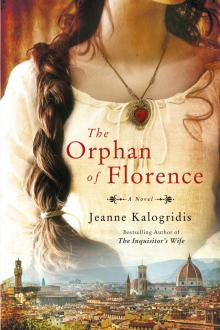 The Orphan of Florence
The Orphan of Florence Lord of the Vampires
Lord of the Vampires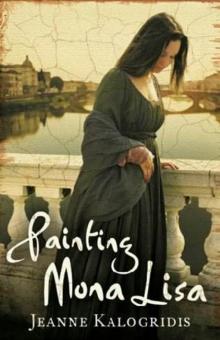 Painting Mona Lisa aka I, Mona Lisa
Painting Mona Lisa aka I, Mona Lisa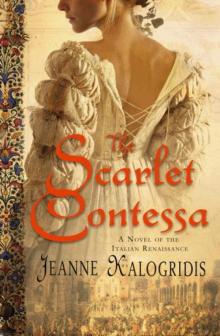 The Scarlet Contessa
The Scarlet Contessa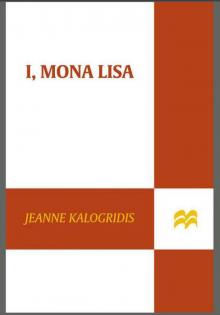 I, Mona Lisa
I, Mona Lisa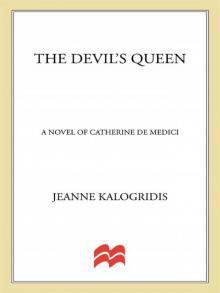 The Devil's Queen: A Novel of Catherine de Medici
The Devil's Queen: A Novel of Catherine de Medici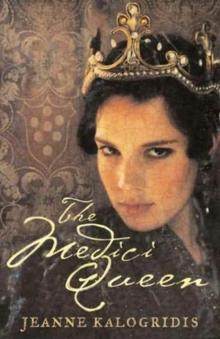 The Medici Queen aka The Devil’s Queen
The Medici Queen aka The Devil’s Queen The Inquisitor's Wife
The Inquisitor's Wife The Borgia Bride
The Borgia Bride